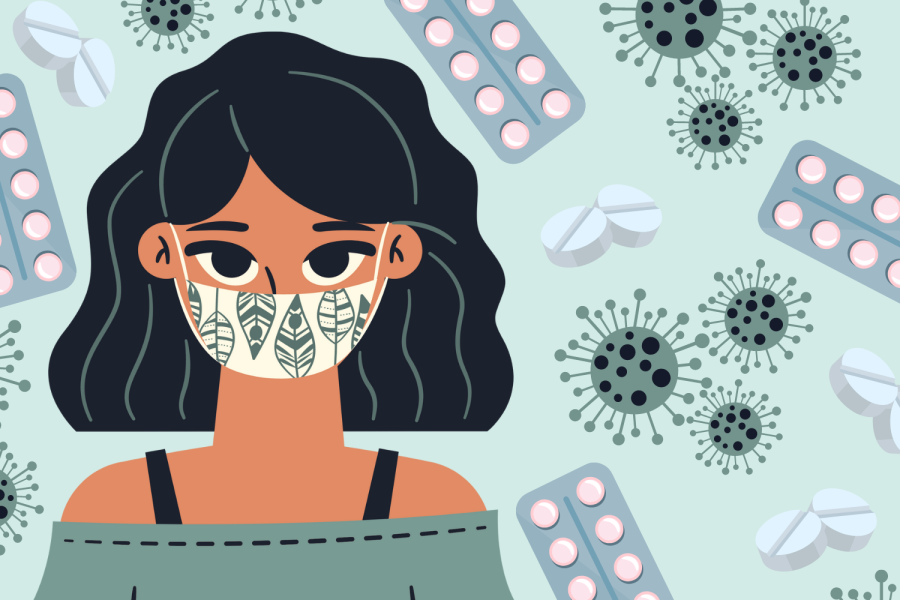Approximately 44 percent of college students have reported experiencing symptoms of depression or anxiety, and this number rises every year. Subsequently, the reported use of antidepressants has doubled from 8.0% to 15.3% from 2007 to 2019 alone. As unlikely as it seems, the unfortunate reality of declining mental health across the globe might actually play a role in protecting students from the tragedy of COVID-19. We sat down with the lead researchers of a study elucidating this revolutionary discovery to find out more.
With the latest strain of the virus, omicron, threatening once again to overrun hospitals, scientists all over the world have been searching for a way to mitigate the detrimental effects of the virus.
A study with 83,584 patients confirmed to have COVID-19 during an emergency department visit across 87 healthcare centers conducted by Dr. Tomiko Oskotsky et al noted that 3,401 patients confirmed to be on SSRI medication experienced reduced mortality rates with particular emphasis on the drug Prozac. The researchers from the University of California at San Francisco and Stanford University noted that patients on antidepressants had a 28% lower death rate. This importantly called into light the benefits of the anti-inflammatory response of the medication at the neurotransmitter level and highlighted its unique positive impact in treatments.
In order to gain further insight into the study, we spoke with the lead researchers, Dr. Oskotsky, Dr. Marić and Dr. Sirota. Dr. Oskotsy’s answers are detailed below.
Vanderbilt Hustler: What was the initial idea or established research that influenced you to observe the relationship between Selective Serotonin Reuptake Inhibitors and COVID-19 mortality rates?
Dr. Oskotsky: Several studies, including a small observational study by Hoertel et al (2020), showed a decreased mortality among hospitalized patients with COVID who were prescribed antidepressants and particularly Selective Serotonin Reuptake Inhibitors (SSRIs). These studies motivated us to explore the outcomes of patients with COVID prescribed SSRIs in a large electronic medical record dataset.
There are different kinds of antidepressants, the most common being Selective Serotonin Reuptake Inhibitors (SSRIs), as mentioned by Dr. Oskotsky. SSRIs are drugs that prevent the reuptake of the neurotransmitter serotonin at the neurological synapse and evoke feelings of joy or happiness. In addition to affecting the body’s mood, SSRIs have been shown to have anti-inflammatory properties as they decrease the expression of inflammatory molecules, such as cytokines, which are directly modulated by the serotonin neurotransmitters of the nervous system. Desipramine (Norpramine) and fluoxetine (Prozac) are two medications that rank highly in this regard.
A key symptom of the coronavirus is inflammation in the body. The contraction of a virus or pathogen of some sort generally invokes the body’s inflammatory response. However, with COVID-19 and its associated mutant strains, the inflammatory response in elderly or immunocompromised patients can prove to be deadly. In fact, severe COVID cases commonly present with acute respiratory distress syndrome and/ organ failure brought about by the stark increase in cytokines. As such, new research geared towards antidepressants and their potential role in COVID-19 treatments has proven influential.
Since its release, other scientists have come forth and reiterated your results with their own. What is the best method to reproduce and reinforce your conclusions? For example, through observation of patients in healthcare clinics and locations or observing the in vivo effects of the medication?
Dr. Oskotsky: Large, randomized clinical trials would be needed to elucidate the effect of SSRIs generally, or more specifically of fluoxetine and fluvoxamine, on the severity of COVID-19 outcomes.
Though more research is necessary to demonstrate the long-term effects of the drugs on COVID-19 and treating the related infections, the results are promising and have sparked new interest within the scientific community. Several scientists have come forth and confirmed similar observations in trends as the study discussed above, reinforcing the results.
Where does your research go from here? What is the next step for scientists interested in furthering it?
Dr. Oskotsky: More studies, particularly large randomized clinical trials, exploring the effects of SSRIs in patients with COVID-19 would be beneficial.
This discovery is incredibly important and yet not as widely popularized. Why do you believe this is so and what is the best way to combat that?
Dr. Oskotsky: This study actually received a lot of attention from the press. We believe that science communication, the ability to talk about your findings to the general public, is important.
The significance of the discovery also ties into Prozac being generally inexpensive and widely accessible for the public, revealing how its usage could lead to meaningful health improvements.
How do you expect students to react to this information? How should they?
Dr. Oskotsky: Observational studies that use electronic medical records allow us to quickly explore already approved drugs that could be repurposed to treat conditions other than those for which they were previously prescribed. Large randomized clinical trials often require a large investment of time and money to be completed. The findings from observational studies can be used to inform which clinical trials to conduct and identify new therapeutic uses for existing drugs.
When asked if other types of antidepressants, such as Selective Norepinephrine reuptake inhibitors, would yield similar results to the SSRIs, Oskotsky said that as such medications were not analyzed, a conclusion could not be drawn.
Additionally, the number of patients using fluvoxamine that were taken into account as part of the analysis was not sufficient to draw a robust conclusion regarding the drug or similar drugs in the context of the study.
The battle against the coronavirus still rages strong and knowledge about therapeutic techniques proves invaluable during these tumultuous times. Importantly, long-term usage of antidepressants also has other side-effects, including possible withdrawal symptoms and weight gain, so there is still much to be discovered about this potential form of treatment.
Editor’s Note: Only paragraphs preceded by a quote attribution are the words of Dr. Oskotsky.




















